What does & doesn’t work in the work world: First and foremost this list of what does & doesn’t work in the work world is non-exhaustive. Meaning there are many, many more items that can be added to this list. Feel free to add them in the comments below.
As for “What Does Work in the Work World”, if you haven’t figured it out yet, you soon will if you don’t heed the advice of this list. If you don’t take this list seriously at first read, I can hardly blame you. You are a gentle soul with pure hopes for not only the world, but your company. (I was once this person, too).

Wish It All Worked
I’m not a cynic, I’ve just been around for a minute. I wish just as much as the next person that the “What Doesn’t Work in the Work World” list actually DID work. It would save all the good people of the world a lot of time and energy and reward them for their noble efforts & accomplishments. But it does not work like that.
And maybe you do work at one of the (few, very few) companies who do reward good-hearted people for their noble endeavors and achievements. But the majority of you DON’T. Even if you think you do… 99% of you don’t. Trust me on this. I don’t care if you work for a non-profit, if you have the most virtuous position, a benevolent boss, an upstanding team, an altruistic mission… it doesn’t matter.
It might matter in small ways, but soon you will find out that you’ve gotten burnt. From that same do-good company. Or someone around you has. And it hurts.It doesn’t make sense. Because it’s business. And what works in your personal and day-to-day life does not work the same in business.
Put People First or Profits?
Even if you work for a company that “puts people first” – be wary. So wary. This can actually be a red flag. The amount of companies that claim they “put people first” but actually put profits first is too many to count and those that don’t are too few and far between.
Real-time evidence of companies putting profits before people: “Steeply rising profits, economic growth and stock market highs – coupled with near-stagnant wages – has been the story of the American economy for decades. Most economic gains have gone to the top” (Reich, The Guardian, 2022).
That “near-stagnant wages” part for the last two decades involved you… as in YOUR wages have been stagnant. Our wages have been stagnant. And corporations are doing just fine. So, no more of this “people first” rhetoric until we see the evidence.
I Used to Believe It Would Work
I believed these list of items would help me get where I wanted to go for a long, long time. Too long. But hear it from me, it DOES NOT WORK. I kept my head down, did hard work, regularly went ‘above and beyond’, & was fiercely loyal. Those were all my biggest mistakes.
It doesn’t matter how hard you work, how noble you are, how loyal you are – YOU have to know your worth to get anywhere. YOU have to be the one touting your own accomplishments, tooting your own horn, letting your boss and everyone around you know how damn amazing you are. Make sure they know it. And make sure they know that you know, too.

Without further ado, from the what does & doesn’t work in the work world, here’s the list of what DOESN’T work:
*Disclaimer: Some of these items might work sometimes with some people, sure… But… not often enough for enough people in enough situations for it to be a norm.
What Does & DOESN’T Work in the Work World
What DOESN’T Work in the Work World:
- Hard work
- Being nice
- Overachieving
- Loyalty
- Waiting to be recognized to get a raise or promotion for your achievements
What DOES Work in the Work World:
- Asking for more money
- Regularly sharing your accomplishments & contributions
- Being ready to walk when expectations aren’t met
- Leaving a job for a better one / better pay
- Being your own boss
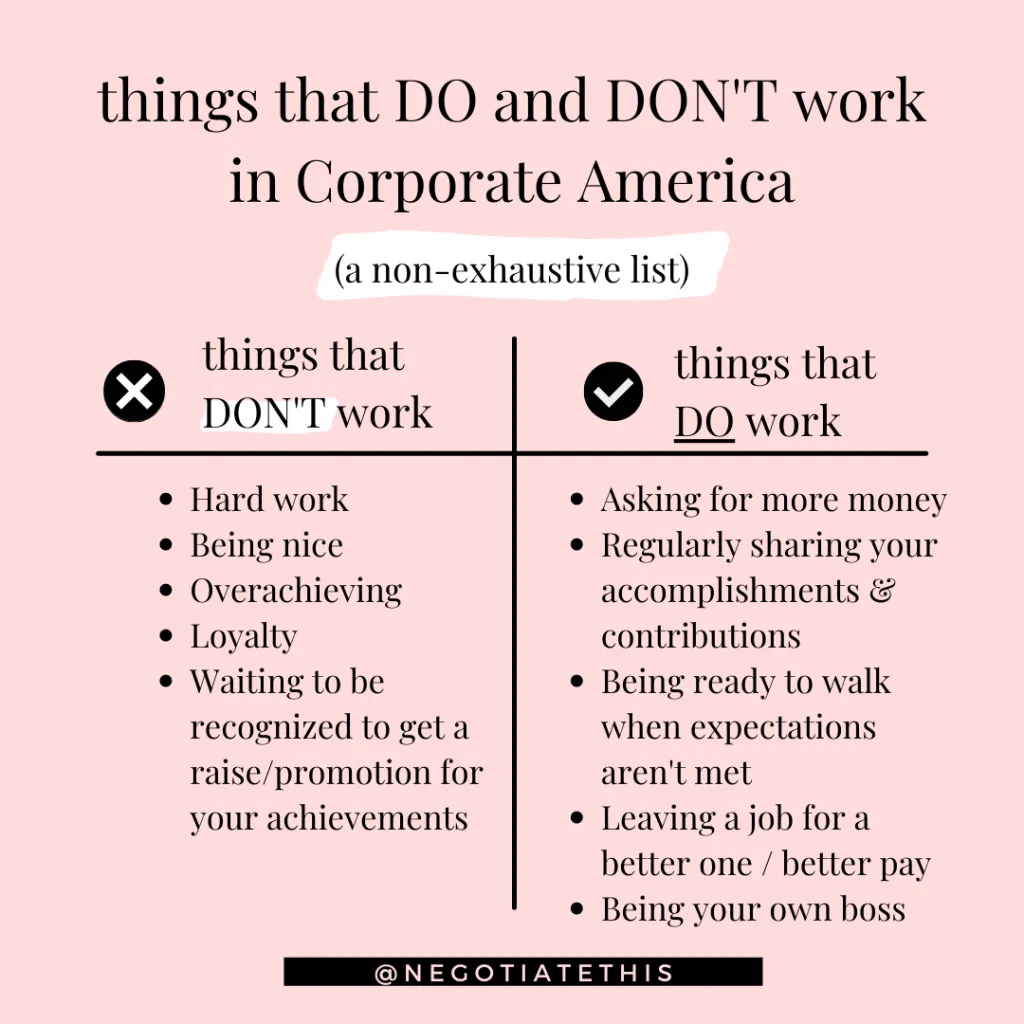
What DOESN’T Work in the Work World:
1. Hard Work
In the list of what does & doesn’t work in the work world, hard work does not work. This is why you don’t see people with straight As running the company (or the country). It’s those C achievers (and lower) that are running the show. This is one small example that demonstrates working hard doesn’t always pay off.
Hard Work Will Only Get You So Far
Sure, it might, in some circumstances, get you some places. But it won’t get you everywhere. And you have to recognize the places it will and won’t get you.
In corporate America hard work begets… more work. Not more money. Not a promotion. It might get you recognition… but for what? To give you more work? Raise your hand if you have been on the receiving end of doing great work only to be rewarded with… more work?? And it’s supposed to be taken as an honor.
In corporate America hard work begets… more work.
– negotiate this
No more of this. Recognize the work that will and won’t get you to the places you want to go, the rooms you want to be in, the tables you want to sit at. No more extra work for hard work.

2. Being Nice
If you’re a nice person, you already know… it doesn’t get you places in the work world. At least not that alone. You have to be nice AND strategic. Or just strategic. We’ve all seen our fair share of people who are not nice and are in some pretty dominating positions. That’s not to say don’t be nice. Anyone who has worked for a real jerk will tell you not to follow this path. But you need to leverage your other capabilities.
In the list of what does & doesn’t work in the work world, I really wish being nice worked. I wish nice people got the reverence they deserved. And they do in other arenas of life. No one ever forgets how someone makes them feel or how a nice act really changed their day & life. But one arena where you need to pair kindness with another skill is in the work world.
Kindness Has Long Been Misinterpreted
This item would be incomplete without naming that “being nice” is often a factor that some get judged on and others don’t. “Being nice” has long been an unjust bias in the workplace.
“Organizations have to be vigilant about challenging the biases that force women to do this in the first place. The workplace is often structured in ways that reward behavior that’s considered socially appropriate in white men but socially inappropriate in women and people of color. This provides an invisible escalator for white men” (Williams, 2019).
If you’re judging people on kindness or being nice, make sure it’s not women or people of color… their persona is misjudged far too often.
“Feedback” on Personality
Research has found that women frequently get “feedback” on their personality. And that’s not a good thing. Because it’s painfully biased. “Feedback to men tends to focus on the substance of their work, whereas women are 22% more likely to receive feedback on their personality” (Snyder & Lee, 2022). Work isn’t about work for women, it’s still a personality and likability trap.
Collaborative & Nice
Furthermore, women are reported as being nice – and that should tell us all we need to know. Being nice doesn’t work. Read on…
“Women are also twice as likely to report being described as collaborative and nice, seven times more likely to report being described as opinionated, and 11 times more likely to report being labeled as abrasive. By contrast, men are three times more likely to report being described as confident, and almost four times as likely to report being described as ambitious” (Snyder & Lee, 2022).
Just look around and we can see if these “collaborative and nice” efforts are paying off. Assessing the landscape, we can very clearly see who’s running companies and who’s not. Being nice does not get you places. The evidence is all around us.
So in conclusion, being nice doesn’t work. It’s a twisted, losing game, especially for women and people of color.
This Is Not To Say Don’t Be Nice
This is not to say don’t be nice. Sure, the world needs hard-working, nice people. But just know that being nice WON’T get you a higher paycheck. It WON’T give you that promotion. You need a different skill set for that.
3. Overachieving
This goes along with hard work. Overachieving needs to be specifically named apart from hard work to further serve as a warning. If you are going ‘above and beyond,’ make sure you know why, what you’re aiming for, and the desired result.
Take it a step further. Make a plan, meet with your superior, agree to it, and put it in writing. That way, as you are overachieving, it’s for a very specific effort in order to gain a specific outcome. That could be more money, a promotion, or another item at work you deem important.
In the list of what does & doesn’t work in the work world, so many have named that overachieving in your work life doesn’t get you where you want to go. Why would I want to work harder on your goals than my own? What will my overachieving even get me (don’t answer that – I already know that answer: more work).
Overachieve in Other Parts of Your Life
If you’re going to overachieve, let it be for yourself – in your personal life, your hobbies, your own business endeavors. And if you are overachieving at work, make sure you have an agreed upon outline for the end goal (and please make sure it’s in writing).
4. Loyalty
This is probably #1 on the list of what does & doesn’t work in the work world. We’re seeing study after study demonstrating loyalty does NOT pay off (it’s been like this for a long time, but we’re finally dedicating research to it).
“Staying employed at the same company for over two years on average is going to make you earn less over your lifetime by about 50% or more” – and that’s at the low end of the spectrum. That % could be much higher (Keng, 2022).
Worst Kept Secret
“The worst kept secret is that employees are making less on average every year” and one item that contributes to that is staying at the same place of work (Keng, 2022).
Quite literally, loyalty does NOT pay off. At all.
If you leave a company and join a new one, you can expect anywhere from a 10-30% pay increase on average (Keng, 2022).
That is a very good reason to take this item on what does & doesn’t work in the work world very seriously.
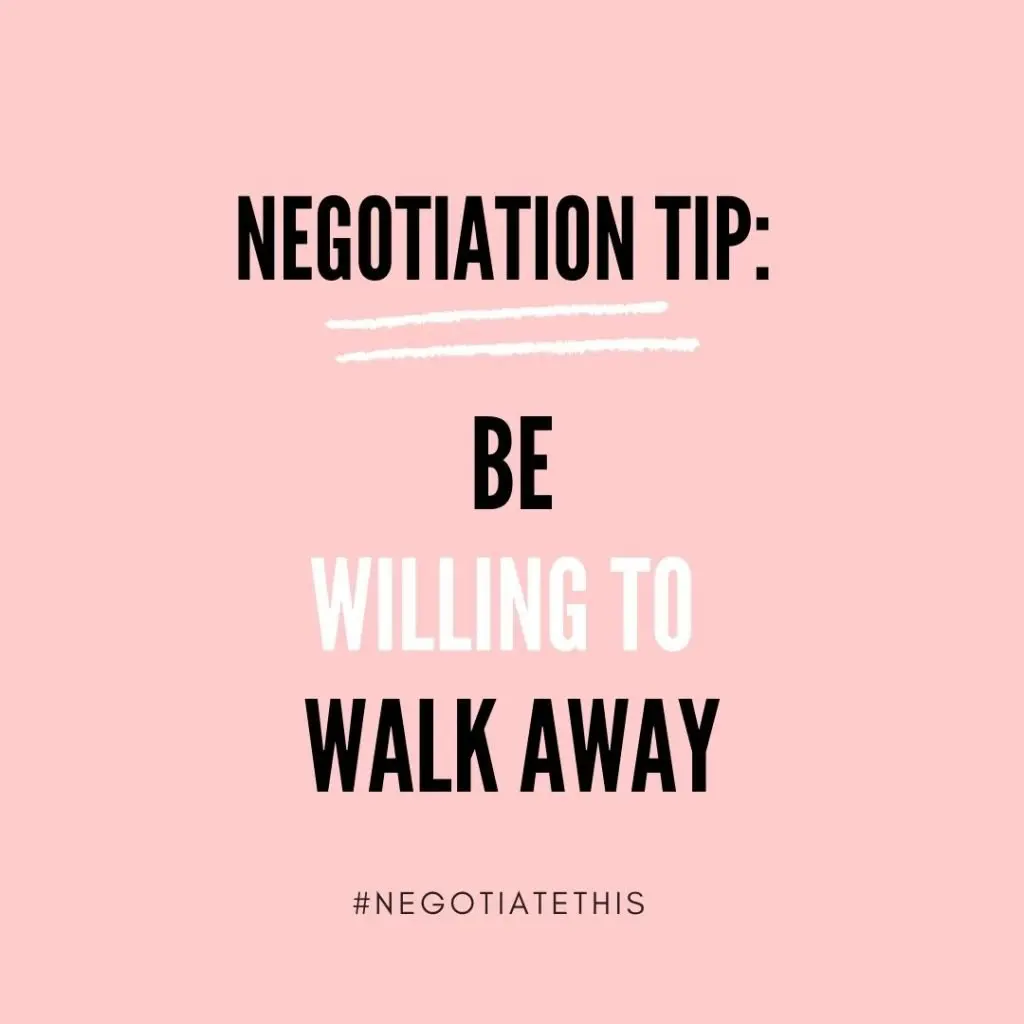
5. Waiting to be Recognized to Get a Raise or Promotion for Your Achievements
With this tip of what does & doesn’t work in the work world, if you wait around to be recognized, you’re going to be waiting for the rest of your life.
“…If you don’t make your accomplishments crystal clear to management, they won’t be aware of them” (Ortakales Dawkins & Shana Lebowitz, 2020).
Spoiler Alert: Your Boss Doesn’t Know
Spoiler alert: Your boss doesn’t know all your achievements and the things you’re doing. And it’s likely not because they don’t care. It’s because you’re doing so many great things that it’s hard to keep track. And they’re super busy too.
So don’t wait around to be recognized. Everyone is busy. Don’t feel sheepish to share this information. How else will they know that you need a raise or promotion if you don’t explicitly & regularly spell it out for them?

What DOES Work in the Work World:
1. Asking for more money
This is inversely linked to the last tip of ‘waiting to be recognized to get a raise or promotion for your achievements’ of what does & doesn’t work in the work world. You’ll be waiting forever if you wait to be recognized.
You have to spell it out & ask for more money. No one will be able to read your mind and know that you want and deserve more money. You need to be explicitly & regularly sharing them. Your boss likely won’t know that you are due for a raise unless you make the case for it and explicitly ask.
Get your 3 numbers ready & your reasons for asking & then make the ask.
If you don’t ask, you won’t receive.
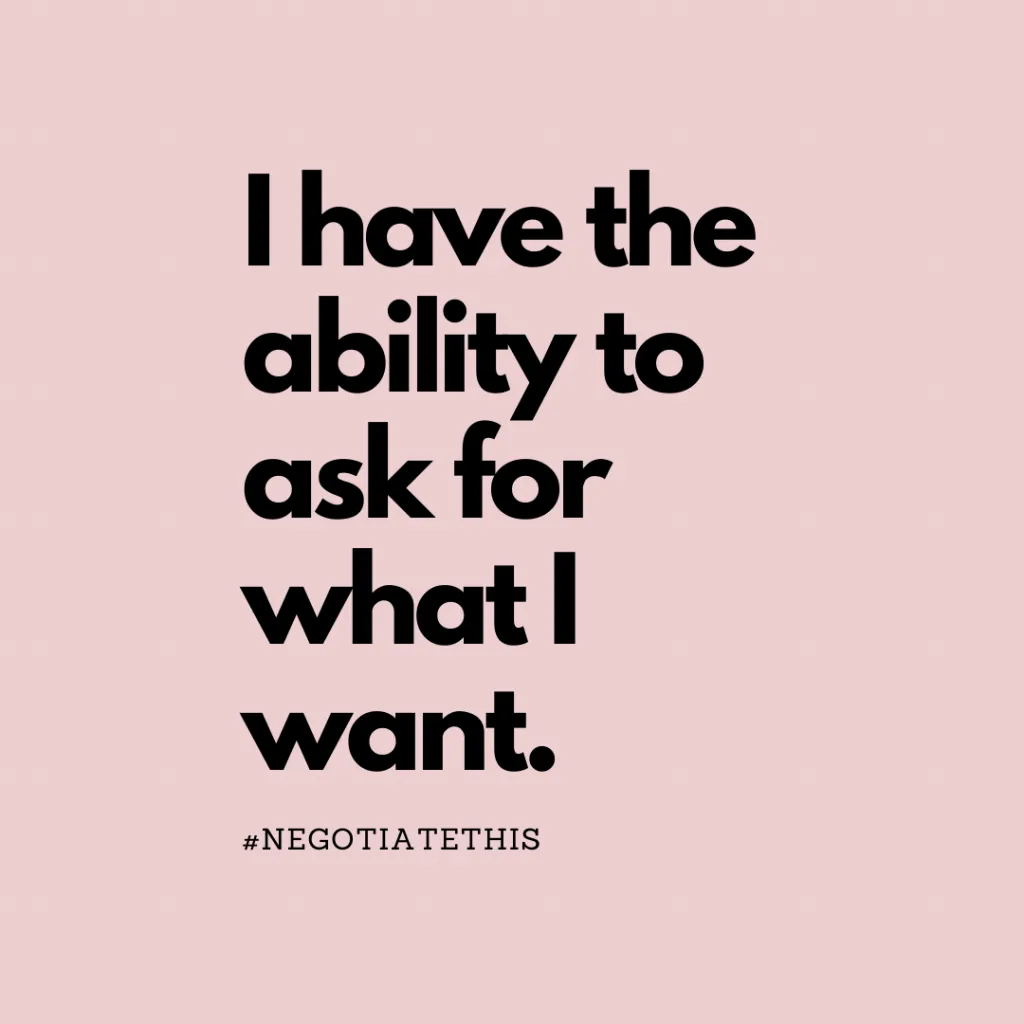
2. Regularly sharing your accomplishments & contributions
This is directly linked to asking for more money. First, keep track of your work wins. Tracking your work wins can be a game changer for your career. You can’t possibly remember all the great feedback, projects and service you provide. Keep a running list of it so it doesn’t get lost in the day-to-day grind.
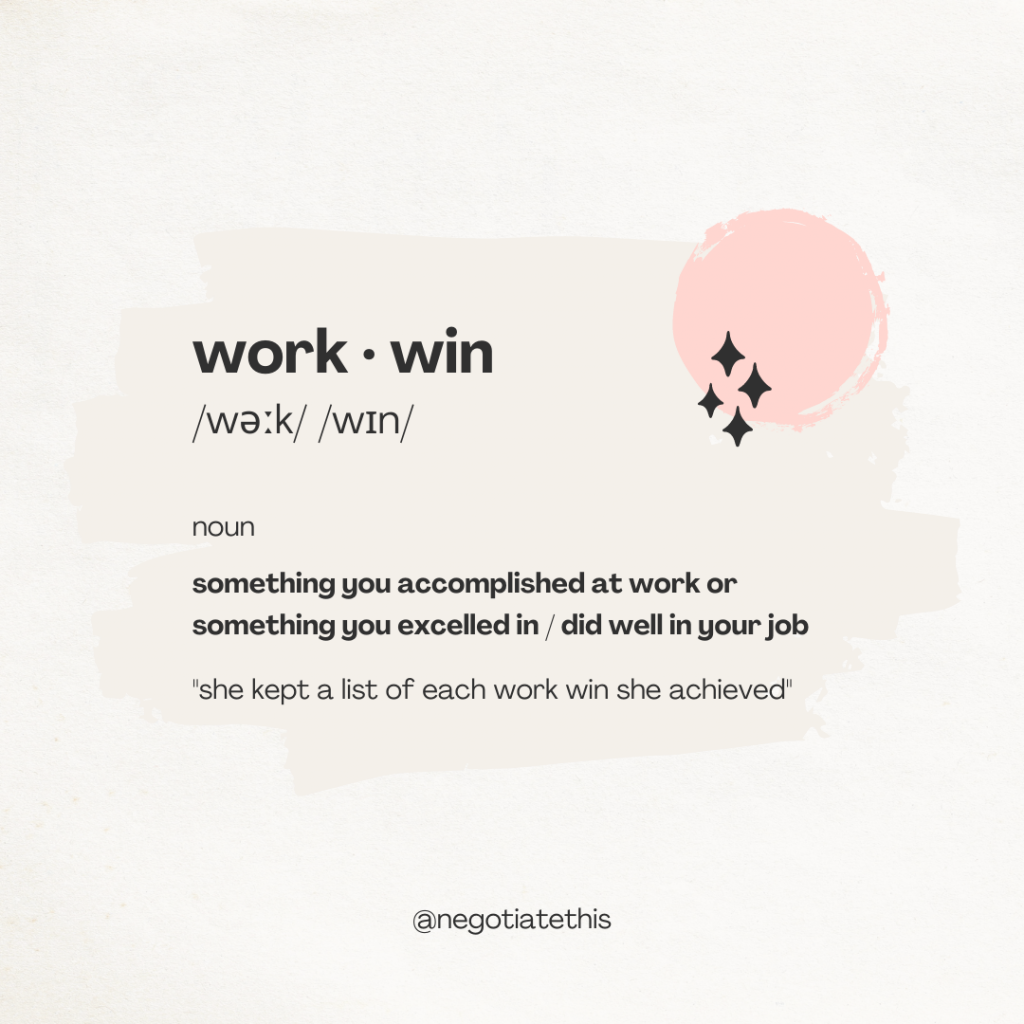
Self-Advocacy Pays Off
Then after you have your list, regularly share it. “Self-advocacy is not only key to getting ahead professionally — it can also uplift your team and generate better collaboration within your company” (Ortakales Dawkins & Shana Lebowitz, 2020). Double win. This will help you stand out.
“Communicating what you and your team have accomplished helps senior management identify the company’s most valuable employees. This is important because most senior managers have no idea who the key players are” (Ortakales Dawkins & Shana Lebowitz, 2020).
Again, your boss doesn’t know all the great things you’re doing. Make it EASY for your them to bring you up in a room. Let them know how Boss (pun intended) you’re being.

How To Let Your Boss Know
I know it can feel scary and maybe silly to be constantly praising yourself and letting your boss know of all those little wins. But work it make it a habit. Cc them on an email. Make it more formal and send an outline of monthly accomplishments and responsibilities. You could start off a meeting with everyone sharing a work win. Get creative with something that fits your style. Or, step out of your comfort zone and do something you wouldn’t normally do.
A Win For You Is A Win For Your Boss
Because at the end of the day, a win for you is a win for your boss. And why wouldn’t they want you to be winning? (If they’re put off by you sharing wins… does that mean you need to have a conversation about alignment? Or is it a clear sign that it’s a toxic work environment/ toxic boss. That’s your call – you know your situation best, obvi.)
*Reminder that in many negotiation situations, your boss has to make a case to THEIR boss of why you deserve the raise. So make sure you’re consistently making a strong case to your boss.
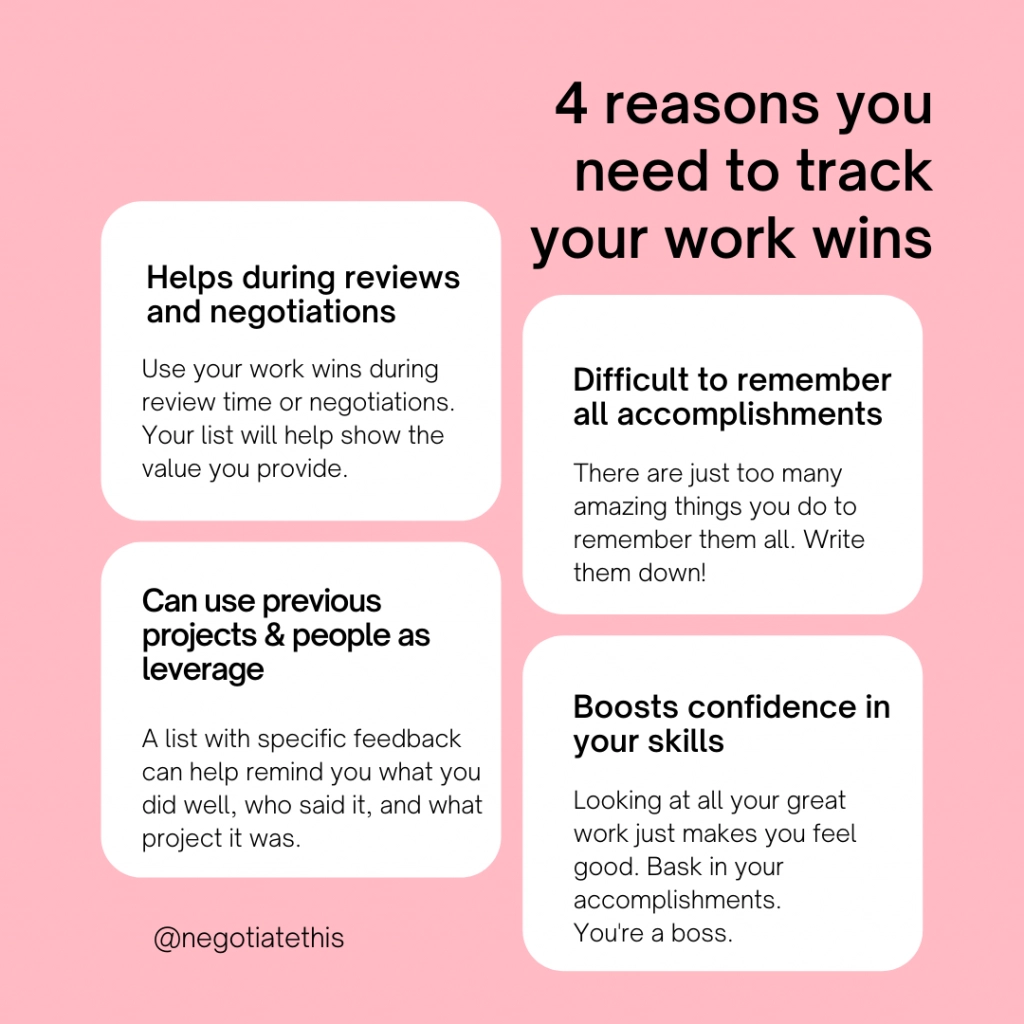
3. Being ready to walk when expectations aren’t met
Being ready and willing to leave is a powerful position to be in. As much as you can, always be ready to walk away if your expectations aren’t met.
When does this come into fruition? One example is if you have been working toward a raise or promotion. When specific goals and outcomes have been outlined, you’ve met them, and then no changes are made, this is a prime example of when you want to be ready to walk because your expectations haven’t been met.
How can you be ready? It can be in small ways. Make sure your resume is updated. Have your LinkedIn profile current. Be in conversation with recruiters. Let your network know you’re open to opportunities.
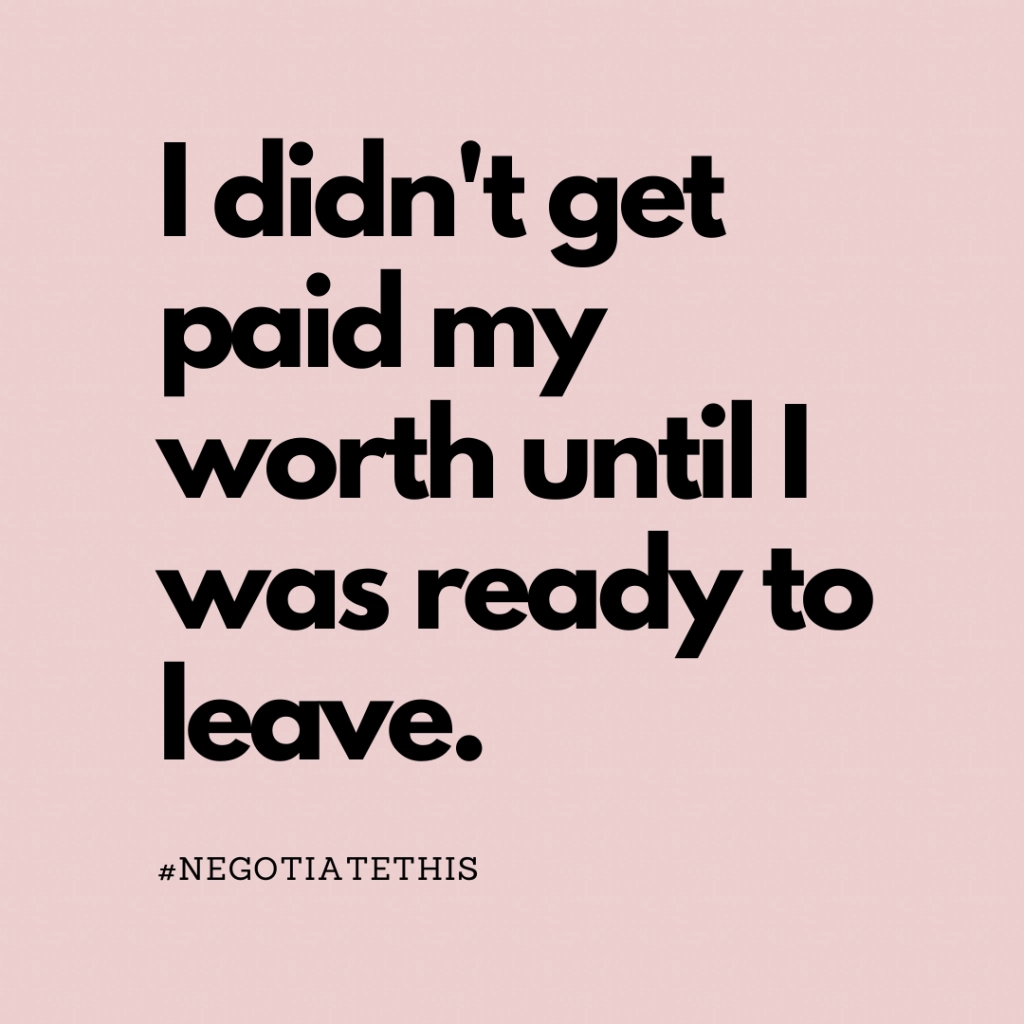
4. Leaving a job for a better one / better pay
Leaving is powerful. This tip within what does & doesn’t work in the work world is at the top of the list. This is the inverse of loyalty. As covered, loyalty does not pay off.
Always be shopping around. Even if you don’t want to leave, see what’s out there.
So many. SO MANY people report increasing their salary by leaving. Or by shopping around and coming back to their current employer with the competitive offer. It’s either matched, raised, or they leave to that company offering them more.
Leave your LinkedIn status to “open to opportunities”. Recruiters sometimes put dollar amounts $$$ in your inbox. That gives you 1) information about the market and 2) a competitive argument for a negotiation and raise or to leave.
Pay Stagnates
It is no secret that your pay stagnates if you’re employed at one place for a long period of time. The average loyal employee gets 2-5% raises per year. Job hoppers get much more. They get from 10-30% of a salary increase (Keng, 2022).
So get out there if increasing your income is an important factor to you (and with inflation continually increasing, that might be all of us).
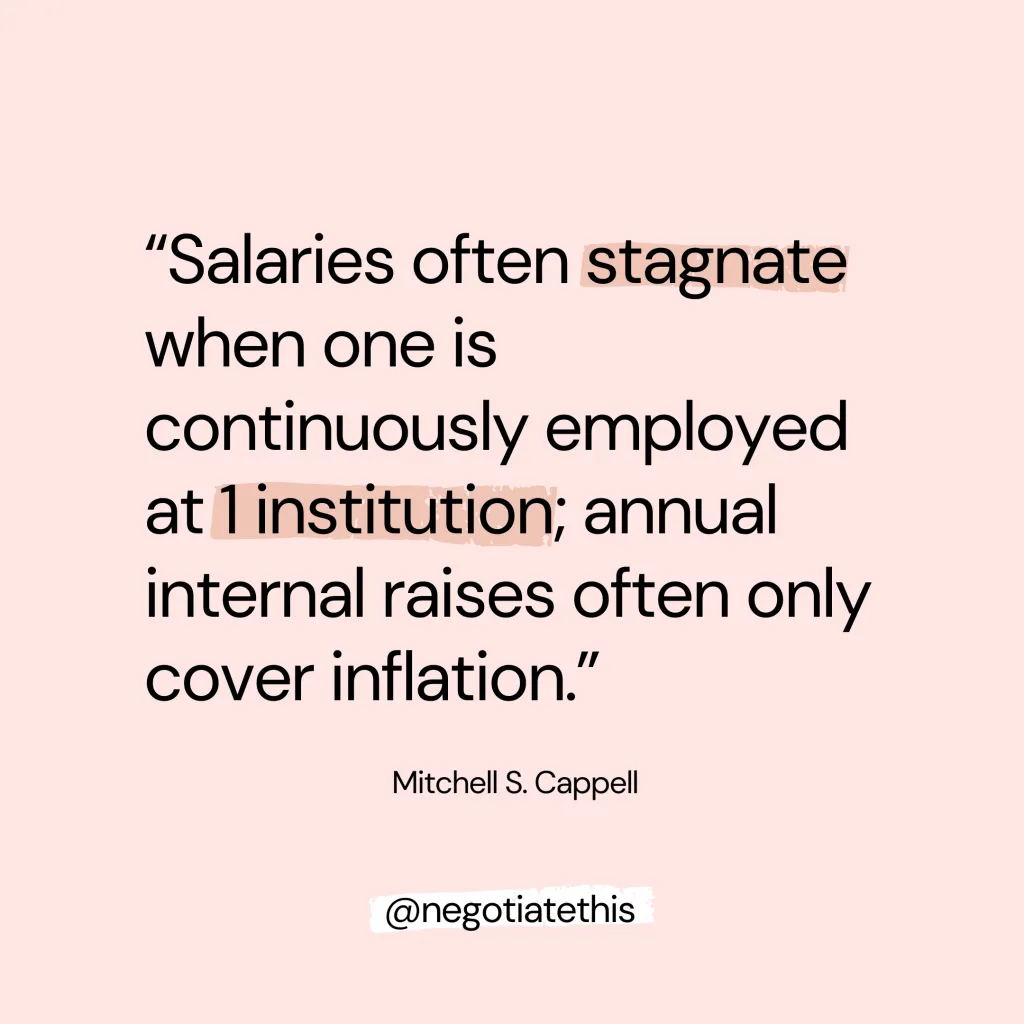
5. Being your own boss
We’ve seen record numbers of people starting their own businesses. Is it because the workplace is not serving us? Tired of the corporate red tape and problematic cultures, freedom in making your own path and being your own boss is an appealing option for many. This tip in what does & doesn’t work in the work world is increasingly popular.
The U.S. Census Bureau showed an increase of new business applications from 2020 to 2021: “ 5.4 million new business applications were filed in 2021, surpassing the record set in 2020 of 4.4 million” (Hsu, 2022). People are ready to make changes and be their own boss. Women and people of color are at the front of the line. The work world so frequently fails them, it’s not hard to see why.
Fewer Wage Gaps When You’re Your Own Boss
Being your own boss appears to have its monetary perks as well. Data from Eden & McCallum shows that “when women are employed as consultants in organizations… they tend to make about 30% less than men. But when these women work independently, there’s only a 3% gender pay gap” (Eden & McCallum; HBR: Women at Work, 2021). It’s no wonder so many women are opting out of the workforce and opting into their own endeavor. Fewer wage gaps? Yes, please.
Black Women Lead In Starting New Businesses
Breaking it down a bit more, “Black women are more likely to start a new business… In the United States, an astounding 17% of Black women are in the process of starting or running new businesses. That’s compared to just 10% of white women, and 15% of white men” (Kelley, Majbouri, & Randolph, 2021).
This likely is due to many factors, no doubt the constant barriers in the workplace for Black women, the barrage of micro-aggressions, and lack of change despite heavy rhetoric for DEI efforts, all play a part.
Being your own boss, especially for women and people of color, is an increasingly appealing option in the current landscape of workplaces that adopt change at a slug’s pace. There are too few companies that women and people of color can stand, so being your own boss is the next best option by default.

What Does & Doesn’t Work In The Work World
There are many things that contribute to what does & doesn’t work in the work world. These items are constantly changing. What works today in the work world may not work tomorrow. And hopefully that’s because we’ve made changes that benefit the workers, not just those at the very top of companies.
Sources
*Article: “How Women Can Escape the Likability Trap” – @thenewyorktimes (2019)
Author: By Joan C. Williams – Ms. Williams, a professor of law, is a co-author of “What Works for Women at Work.”
*Article: “No more ‘abrasive,’ ‘opinionated,’ or ‘nice’: Why managers need to stop giving women and people of color feedback on their personality” (2022) Forbes
Authors: KIERAN SNYDER AND AILEEN LEE
*Article: “Employees that stay in companies longer than 2 years get paid 50% less” (2022) Forbes
Author: Cameron Keng
*Article: “How to outline your accomplishments in an email to your boss” (2020) Business Insider:
Authors: Jennifer Ortakales Dawkins and Shana Lebowitz
*Podcast: Women at Work – Keep the Challenges of Freelance in Check (2021) (@HBR)
Data: Eden McCallum – an organization through which independent consultants can find work
*Article: “New businesses soared to record highs in 2021. Here’s a taste of one of them” (2022) NPR
Author: Andrea Hsu
*Article: “Black women are more likely to start a business than white men” (2022) Forbes
Authors: by Donna Kelley, Mahdi Majbouri, Angela Randolph
*Cappell, M. (2012). The art of salary negotiation in academic medicine: Lessons from a 32-year career. American Society for Gastrointestinal Endoscopy, 75(4), 857-860. Published by Mosby, Inc.
Disclaimer: While the contents of this post and blog come from research and personal experience, each experience, situation and/or person has their own unique circumstances. This is not negotiation, financial or any other form of legitimate or official advice from an expert. Each individual should do their own independent, comprehensive research. Negotiation, career and all other decisions are the sole responsibility of each individual or party. Details found on the blog and in individual posts are opinions and should be treated as such for entertainment purposes only. Read further disclaimer information on the Disclaimer page.
